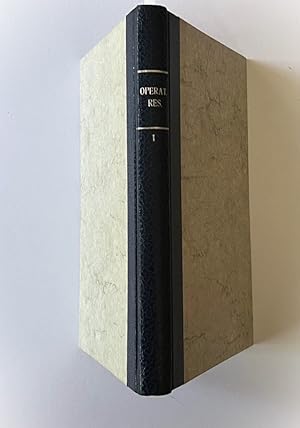New Mathematical Methods Operations Research by Koopman Bernard (2 results)
FeedbackSearch filters
Product Type
- All Product Types
- Books (2)
- Magazines & Periodicals (No further results match this refinement)
- Comics (No further results match this refinement)
- Sheet Music (No further results match this refinement)
- Art, Prints & Posters (No further results match this refinement)
- Photographs (No further results match this refinement)
- Maps (No further results match this refinement)
- Manuscripts & Paper Collectibles (No further results match this refinement)
Condition
- All Conditions
- New (No further results match this refinement)
- Used (2)
Binding
Collectible Attributes
- First Edition (No further results match this refinement)
- Signed (No further results match this refinement)
- Dust Jacket (No further results match this refinement)
- Seller-Supplied Images (1)
- Not Print on Demand (2)
Language (1)
Price
- Any Price
- Under £ 20 (No further results match this refinement)
- £ 20 to £ 35 (No further results match this refinement)
- Over £ 35
Free Shipping
- Free Shipping to United Kingdom (No further results match this refinement)
Seller Location
Seller Rating
-
"New Mathematical Methods in Operations Research" in Journal of Operations Research Society of America
Published by Operations Research Society of America, Baltimore., 1953
Seller: JF Ptak Science Books, Hendersonville, NC, U.S.A.
£ 191.71
Convert currency£ 25.31 shipping from U.S.A. to United KingdomQuantity: 1 available
Add to basketHardcover. Condition: As New. KOOPMAN, Bernard. "New Mathematical Methods in Operations Research" in Journal of Operations Research Society of America, Baltimore, Maryland, volume 1, 1952-1953. The full volume offered, including contributions by Philip Morse, "The Operations Research Society of America", pp 1-3. The Koopman paper appears on pp 3-10 in the volume of 325+16pp. Newly rebound in calf-backed decorated paper boards. Basically in as-new condition. [++] "Bernard Osgood Koopman (January 19, 1900 August 18, 1981) was a French-born American mathematician, known for his work in ergodic theory, the foundations of probability, statistical theory and operations research. In 1931/1932, Koopman and John von Neumann proposed a Hilbert space formulation of classical mechanics, known as the Koopman von Neumann classical mechanics. During World War II, he joined the Anti-Submarine Warfare Operations Research Group (ASWORG, later ORG) in Washington, D.C., directed by Philip M. Morse, to work for the U.S. Navy. The work of Koopman and his colleagues at ASWORG concerned the development of techniques for the US Navy to hunt U-boats. The theoretical work laid the foundations for search theory which subsequently became a field of its own within operations research."--Wikipedia. [++] From the AIP Interview with David Katcher, who worked with the ORA folks and who was founding editor of "Physics Today" and much else: "The ORSA and ORO were entirely different and independent. ORO is the Operations Research Office. That was Johns Hopkins. It worked for the Army on Army problems. ORSA was a professional association called the Operations Research Society of America, which consisted of professionals in the field. It included and was really started by people who started in military OR in World War II but spread into civilian fields. Its members came from professionals with the Navy, the Air Force, and increasingly, of course, from academic and industrial work as well as from the Army. " [++] Also bound with: Koopman, "The Optimum Distribution of Effort" pp 52-63 and much else in this the inaugural volume of the journal.
-
"New Mathematical Methods in Operations Research" in Journal of Operations Research Society of America
Published by Operations Research Society of America, Baltimore, Maryland, 1952
Seller: JF Ptak Science Books, Hendersonville, NC, U.S.A.
£ 345.08
Convert currency£ 25.31 shipping from U.S.A. to United KingdomQuantity: 1 available
Add to basketSoft cover. Condition: Good. KOOPMAN, Bernard. "New Mathematical Methods in Operations Research" in Journal of Operations Research Society of America, Baltimore, Maryland, November 1952, volume 1/number 1 (first issue). Original wrappers. GOOD copy. Also with Philip Morse, "The Operations Research Society of America", pp 1-3. The Koopman paper appears on pp 3-10 in the issue of pp 1-32. Scarce. The copy of David Katcher, with his name in pen at the top right corner of the front cover. [++] "The ORSA and ORO were entirely different and independent. ORO is the Operations Research Office. That was Johns Hopkins. It worked for the Army on Army problems. ORSA was a professional association called the Operations Research Society of America, which consisted of professionals in the field. It included and was really started by people who started in military OR in World War II but spread into civilian fields. Its members came from professionals with the Navy, the Air Force, and increasingly, of course, from academic and industrial work as well as from the Army. " AIP Interview with David Katcher, who worked with the ORA folks and who was founding editor of "Physics Today" and much else. [++] "Bernard Osgood Koopman (January 19, 1900 August 18, 1981) was a French-born American mathematician, known for his work in ergodic theory, the foundations of probability, statistical theory and operations research. In 1931/1932, Koopman and John von Neumann proposed a Hilbert space formulation of classical mechanics, known as the Koopman von Neumann classical mechanics. During World War II, he joined the Anti-Submarine Warfare Operations Research Group (ASWORG, later ORG) in Washington, D.C., directed by Philip M. Morse, to work for the U.S. Navy. The work of Koopman and his colleagues at ASWORG concerned the development of techniques for the US Navy to hunt U-boats. The theoretical work laid the foundations for search theory which subsequently became a field of its own within operations research."--Wikipedia.



